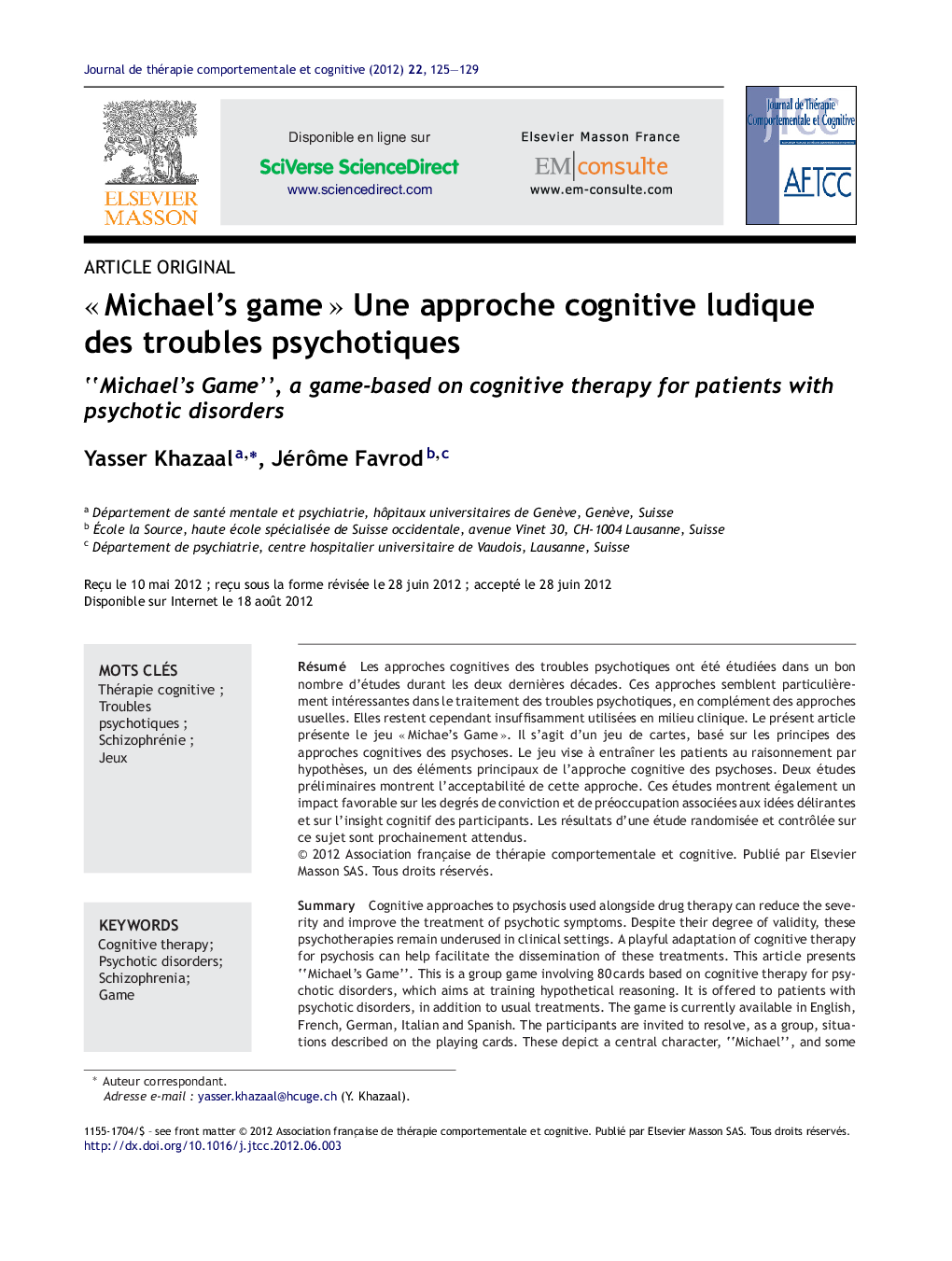| کد مقاله | کد نشریه | سال انتشار | مقاله انگلیسی | نسخه تمام متن |
|---|---|---|---|---|
| 934669 | 923685 | 2012 | 5 صفحه PDF | دانلود رایگان |
عنوان انگلیسی مقاله ISI
« Michael's game » Une approche cognitive ludique des troubles psychotiques
دانلود مقاله + سفارش ترجمه
دانلود مقاله ISI انگلیسی
رایگان برای ایرانیان
کلمات کلیدی
موضوعات مرتبط
علوم پزشکی و سلامت
پزشکی و دندانپزشکی
روانپزشکی و بهداشت روانی
پیش نمایش صفحه اول مقاله

چکیده انگلیسی
Cognitive approaches to psychosis used alongside drug therapy can reduce the severity and improve the treatment of psychotic symptoms. Despite their degree of validity, these psychotherapies remain underused in clinical settings. A playful adaptation of cognitive therapy for psychosis can help facilitate the dissemination of these treatments. This article presents “Michael's Game”. This is a group game involving 80 cards based on cognitive therapy for psychotic disorders, which aims at training hypothetical reasoning. It is offered to patients with psychotic disorders, in addition to usual treatments. The game is currently available in English, French, German, Italian and Spanish. The participants are invited to resolve, as a group, situations described on the playing cards. These depict a central character, “Michael”, and some of his close relatives and friends. The game is led by one or two psychiatric caregivers (psychologists, nurses, doctorsâ¦) trained in the supervision of the game. The players are asked, for example, to identify the situation on each card (before interpretation) and Michael's hypothesis relating to this situation. By introducing the principle of hypothesis in a systematic, playful and repeated manner, the game explores the perspective of other hypotheses and methods of assessing or testing them. In particular, the patients are required, for example, to specify the emotional and behavioral consequences of different hypotheses, estimate the probability of each hypothesis or suggest testing it in real life. To date, the impact of this game has been assessed in two multicentric, uncontrolled open studies in a natural environment. A reduction in anxiety and conviction scores associated with delirious ideas measured by the Peter's Delusion Inventory has been observed in these studies. In addition, the game seems to improve cognitive insight as measured by the Beck Cognitive Insight Scale. The proportion of drop-out in these studies was less than 20 %. Although designed to be played in groups, this article reports on the experience of a full game used in individual sessions with a 36-year-old patient with a persistent delusional disorder. The 80 playing cards were examined in 11 individual sessions, with the therapist as a player. The patient was very active from the start of the sessions. By the end of the sessions, it had become natural and spontaneous for the patient to use the term hypothesis for situations of direct concern, generating alternative hypotheses for “himself”. After about a year of weekly sessions, the patient was less concerned about and convinced by his delusion and more likely to question his beliefs. To date, it seems that “Michael's Game” is an interesting, playful approach to psychotic disorders. Its impact on cognitive insight and on degrees of concern and belief associated with delusions comes from specific training in hypothetical reasoning. “Michael's game” can provide an interesting approach to psychotic disorders, as a compliment to usual approaches. A randomized, controlled study has just been completed. It assessed the use of “Michael's Game” in addition to usual treatment at the end of game and distance sessions. The study should clarify the impact of the game and its possible role in treatment.
ناشر
Database: Elsevier - ScienceDirect (ساینس دایرکت)
Journal: Journal de Thérapie Comportementale et Cognitive - Volume 22, Issue 3, September 2012, Pages 125-129
Journal: Journal de Thérapie Comportementale et Cognitive - Volume 22, Issue 3, September 2012, Pages 125-129
نویسندگان
Yasser Khazaal, Jérôme Favrod,